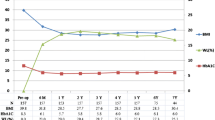Abstract
Importance
In obese patients with type 2 diabetes (T2DM), the marked weight loss following bariatric surgery is accompanied in a consistent number of cases by T2DM resolution or control. The clinical need of preoperative parameters reliable in predicting a positive metabolic outcome at long term following the operation has then emerged.
Observation
A cohort of 135 consecutive T2DM patients with a wide range of body mass index (BMI) at more than 5 years following biliopancreatic diversion (BPD) was considered. The 5-year-T2DM resolution, defined as glycosylated hemoglobin (HbA1C) lower than 6.5% without antidiabetic therapy, was related to demographic, anthropometric, and biochemical findings prior to the operation. The long-term metabolic outcome was positively related to baseline BMI values and negatively with the preoperative use of insulin.
Conclusion
BMI and insulin therapy at the time of surgery are associated with the probability of T2DM long lasting remission and could be used as solid predictors before surgery. In the overweight and non morbidly obese diabetic patients, bariatric surgery is less efficient in determining long term T2DM resolution than in their morbid obese counterparts.

Similar content being viewed by others
References
Buchwald H, Estok R, Fahrbach K, et al. Weight and type 2 diabetes after bariatric surgery: systematic review and meta-analysis. Am J Med. 2009;122(3):248–56. doi:10.1016/j.amjmed.2008.09.041.
Schauer PR, Kashyap SR, Wolski K, et al. Bariatric surgery versus intensive medical therapy in obese patients with diabetes. N Engl J Med. 2012;366:1567–76. doi:10.1056/NEJMoa1200225.
Guidone C, Manco M, Valera-Mora E, et al. Mechanisms of recovery from type 2 diabetes after malabsorptive bariatric surgery. Diabetes. 2006;55(7):2025–31. doi:10.2337/db06-0068.
Valera-Mora ME, Simeoni B, Gagliardi L, et al. Predictors of weight loss and reversal of comorbidities in malabsorptive bariatric surgery. Am J Clin Nutr. 2005;81(6):1292–7.
Müller-Stich BP, Senft JD, Warschkow R, et al. Surgical versus medical treatment of type 2 diabetes mellitus in nonseverely obese patients: a systematic review and meta-analysis. Ann Surg. 2015;261(3):421–9. doi:10.1097/SLA.0000000000001014.
Scopinaro N, Adami GF, Marinari GM, et al. Biliopancreatic diversion. World J Surg. 1998;22(9):936–46.
Scopinaro N, Adami GF, Papadia FS, et al. Effects of biliopanceratic diversion on type 2 diabetes in patients with BMI 25 to 35. Ann Surg. 2011;253(4):699–703. doi:10.1097/SLA.0b013e318203ae44.
Buse JB, Caprio S, Cefalu WT, et al. How do we define cure of diabetes? Diabetes Care. 2009;32(11):2133–5.
Panunzi S, Carlsson L, De Gaetano A, et al. Determinants of diabetes remission and glycemic control after bariatric surgery. Diabetes Care. 2016;39(1):166–74.
Scopinaro N, Camerini G, Papadia F, Andraghetti G, Cordera R, Adami GF. Long term clinical and functional impact of biliopancreatic diversion on type 2 diabetes in morbidly and non–morbidly obese patients undergoing biliopancreatic diversion. Surg Obes Relat Dis. 2015 pii: S1550–7289(15)01101–6.
Fried M, Yumuk V, Oppert JM, et al. International Federation for Surgery of Obesity and Metabolic Disorders-European Chapter (IFSO-EC); European Association for the Study of Obesity (EASO); European Association for the Study of Obesity Obesity Management Task Force (EASO OMTF). Interdisciplinary European guidelines on metabolic and bariatric surgery. Obes Surg. 2014;24(1):42–55.
Author information
Authors and Affiliations
Corresponding author
Ethics declarations
In this type of study, ethical approval is not necessary.
Conflict of Interest
The authors declare that they have no conflict of interest.
Rights and permissions
About this article
Cite this article
Scopinaro, N., Adami, G.F., Bruzzi, P. et al. Prediction of Diabetes Remission at Long Term Following Biliopancreatic Diversion. OBES SURG 27, 1705–1708 (2017). https://doi.org/10.1007/s11695-017-2555-3
Published:
Issue Date:
DOI: https://doi.org/10.1007/s11695-017-2555-3




